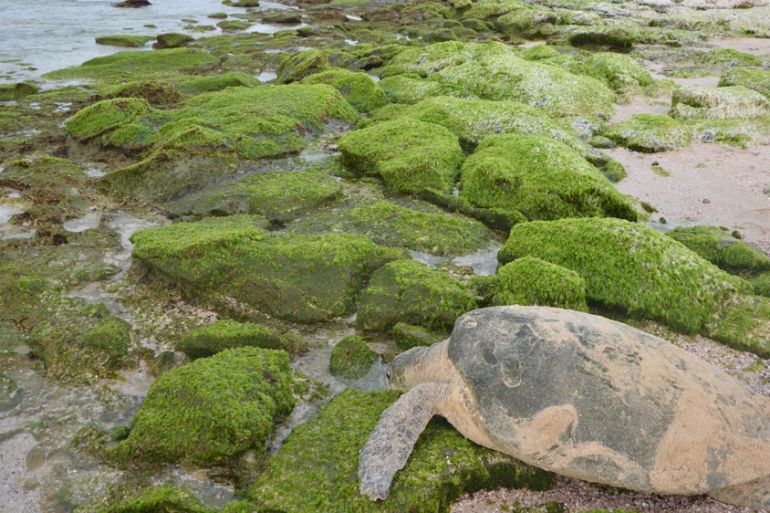Slaughter of rare turtles in Yemen ‘alarming’
Hundreds of endangered turtles have been killed in recent weeks, with some sold to restaurant customers as goat meat.

Sharma, Yemen – At least 250 critically endangered turtles in a national protectorate in Yemen have been killed by humans within the past month, according to area residents and officials.
Sharma Protectorate, a nesting place for rare green turtles, is a two-hour drive east of Mukalla, the capital of Yemen’s eastern Hadramout province. Visitors to the protectorate have been wreaking havoc: snatching one turtle after another, slaughtering them, taking their meat and leaving behind eggs and viscera to decay.
“The killing of the turtles has increased at an alarming scale,” Sheikh Amen Bakhwar, a turtle conservationist and the head of the Environment Friends Association in Addis al-Sharqia district, told Al Jazeera.
Months of turtle hunting has left the area stinking of carrion and has turned its beaches on the Arabian Sea into a hub for stray dogs.
![Sharma Protectorate, a nesting place for rare green turtles, is a two-hour drive east of Mukalla, the capital of Yemen's eastern Hadramout province [Saeed Al Batati/Al Jazeera]](/wp-content/uploads/2016/12/14879e42b5c14769b1dd5163d05945db_18.jpeg)
“This is like hunting any other animal,” Mohammad, a young man who did not provide his last name, told Al Jazeera as he left his tent to catch a turtle.
Like many other hunters who come here, Mohammed and his friends are not ashamed of their turtle hunting – nor are they convinced that it is threatening the species’ survival. “We have heard the same warnings for ages, but look. There are some turtles on the beach,” said Mohammed’s friend, as they prepared to kill another one.
Marine biologists, however, believe that years of human predation have made a big dent in the number of turtles arriving ashore to lay eggs here.
Mohammed Abdullah al-Dohail, the head of the Department of Marine Biology at Hadramout University, told Al Jazeera that hawksbill turtles have already died off in the area and that the green turtles will face the same fate, if their killers are not stopped.
They have committed carnage against the turtles.
“They butcher female turtles who make a landfall to lay eggs,” Dohail explained. “They catch them the moment they leave the sea and do not wait for them to lay their eggs.”
Dohail said that the beach was teeming with turtles a decade ago: “Ten years ago, as many as 50 turtles nested in this beach during procreation season, compared to several turtles in an hour now.”
Al-Qaeda in the Arabian Peninsula had controlled parts of Hadramout, including Sharma, for about a year before being ousted. The al-Qaeda fighters had sealed the protectorate, banning people from visiting the area – not to protect the turtles, but to launch an oil-smuggling operation from an old, neglected seaport there.
Although local residents agree that the turtles enjoyed a respite from human predators during the days of al-Qaeda control, marine biologists say that oil spills and loud trucks likely upset the turtles, which prefer nesting on quiet shores.
![In response to the mass slaughter, local officials held an emergency meeting and approved a number of disciplinary procedures against turtle hunting [Saeed Al Batati/Al Jazeera]](/wp-content/uploads/2016/12/3d0b8e7960b14665b6684e0b5afc6235_18.jpeg)
In response to the reports of mass turtle slaughter, the governor of Hadramout ordered local officials to visit the protectorate and assess the damage. Abdulla Attamimi, the director of the district that includes Sharma, told Al Jazeera that he was appalled by the view of slain turtles scattered across the beaches.
“They have committed carnage against the turtles,” Attamimi said.

Local officials, including the coastguard and security services, held an emergency meeting and approved a number of disciplinary procedures against turtle hunting. Those who kill turtles would be ordered to pay a fine of 100,000 Yemeni rials ($400) and be jailed for 24 hours. Those who disrupt the turtles by firing machine guns – some people go to the area to practise firing guns – would be ordered to pay 50,000 rials ($200), have their guns seized, and spend a day in jail.
To enforce these new regulations, salaries must be secured for as many as 20 guards to be deployed around Sharma. Attamimi said that his office is seeking almost $1,000 in monthly salaries for the guards, and another $1,000 for renovating an abandoned house to host the guards.
“Our top priority is deploying the guards and providing them with equipment to do their job,” he said.
Attamimi urged international conservationist organisations to help him with the funds for paying guards and building a fence around Sharma, but “no one has yet positively responded to my appeals for help”.
INTERACTIVE: Yemen conflict – Who controls what
But securing the necessary funds will not be easy. The poverty-stricken country is in the midst of a civil war between supporters of Yemen’s internationally recognised government and a Saudi-led military coalition on one side, and the Houthi rebels and forces loyal to Yemen’s former president on the other.
Rescuing the threatened turtles in Sharma has taken a back seat to more serious issues, including saving people from famine.
“Visitors [to Sharma] have increased in the last couple of years, despite the trouble around the country. They sell turtle meat to restaurants, who serve them as goat meat,” Attamimi said.
However, the lack of funding has not impeded locals from working to protect Sharma. Attamimi said that local volunteers have been cleaning the picturesque beaches of plastic waste and dead turtles, and enlightening visitors about the stakes of killing off the rare turtles.